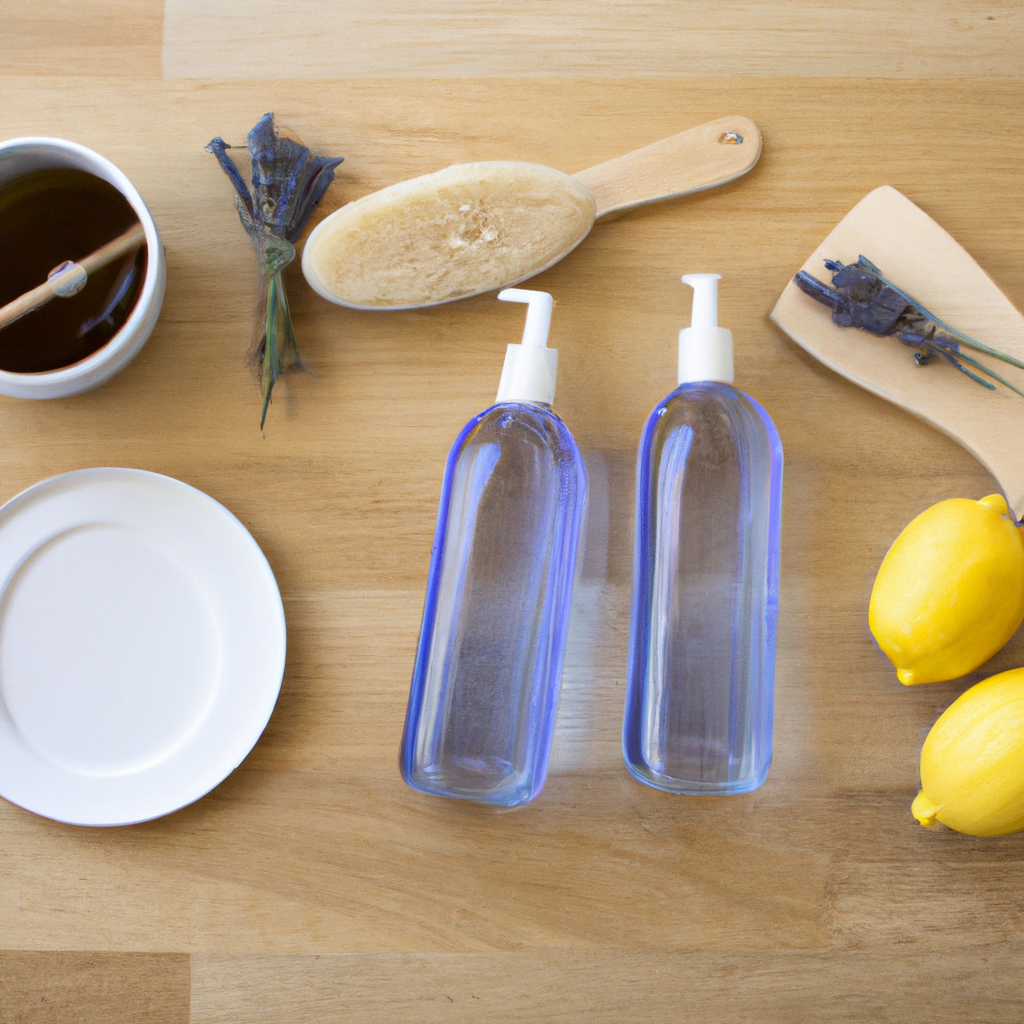If you’re searching for a gentle yet effective solution for your wooden floors, look no further. The article ahead will guide you through the process of making your own homemade wood floor cleaner. With this eco-friendly and budget-friendly solution, not only will you be able to decipher every ingredient that goes into it, but your wooden floors will also thank you for the tender cleaning care. So, brace yourself for a cleaner house, healthier floors, and of course, a happier you!

Understanding the Benefits of Homemade Wood Floor Cleaners
Your decision to create homemade wood floor cleaners comes with exciting benefits that you may never have considered. From saving money to promoting a healthier environment, these benefits are as rewarding as maintaining your wood floors’ appealing aesthetic.
Why choose homemade solutions
You might wonder why you should consider homemade solutions when there’s a range of commercial products available. Well, nothing beats the satisfaction of using ingredients you already have in your home to create a cleaner that’s tailored to the needs of your wood floor. Plus, it offers you an opportunity to bring out your creative side, creating homemade solutions that not only clean but also smell great!
Cost effectiveness of DIY cleaners
One of the significant benefits of DIY cleaners is cost-effectiveness. Most ingredients for homemade wood floor cleaners are everyday household items, which saves you from buying costly commercial products. Some cleaners require nothing more than vinegar, water, and a few drops of essential oil, making them incredibly inexpensive to make.
Environmental and health benefits of natural ingredients
Using natural ingredients for your homemade wood floor cleaners is not only good for your pocket but also for your health and the surrounding environment. Many commercial cleaners have harsh chemicals that may irritate your skin or eyes and negatively impact indoor air quality. Meanwhile, natural ingredients are gentler on your senses and leave less of an environmental impact, which is a win for both you and Mother Nature!
Identifying Different Types of Wood Floors
With several types of wood floors out there, it’s important to identify yours to determine the best cleaning process.
Hardwood floors
Hardwood floors are made from solid wood and are recognized for their durability and timeless appeal. They can handle heavy foot traffic and can be refinished multiple times throughout their lifespan.
Laminate wood floors
Laminate wood floors are not made entirely from real wood. Instead, they are a composite material that simulates the appearance of wood. They are easy to maintain and offer the aesthetic value of wooden floors at a fraction of the price.
Engineered wood floors
Engineered wood floors are created from multiple layers of wood. They offer the beauty of solid hardwood with better resistance to moisture and humidity, making them ideal for various climates and levels of applicable stress.
Benefits of knowing your wood floor type
Knowing your wood floor type is important because each type requires a specific cleaning routine and products. For instance, a cleaner that benefits hardwood floors may not necessarily suit engineered wood floors, and vice versa. Therefore, understanding your floor type lets you deliver the most effective care and maintenance.
Ingredients for Homemade Wood Floor Cleaners
Homemade wood floor cleaners are easy to make with common household ingredients. Let’s delve into some ingredients you’ll likely use.
Essential items commonly found at home
You’d be surprised with the array of effective cleaning products already available in your pantry. Vinegar, baking soda, liquid castile soap, and even olive oil can all be used to create effective homemade wood floor cleaners.
Natural and non-abrasive cleaning agents
Essential oils like lemon, lavender, and tea tree oil are excellent natural and non-abrasive cleaning agents. They offer antibacterial properties and add refreshing scents to your cleaners.
Distilled or tap water?
Water is a key ingredient in most homemade cleaners, serving as the base for the cleaning solution. While you can use tap water, using distilled or boiled water extends the shelf-life of your homemade cleaner since it’s free from contaminants and impurities.
Recipes for Homemade Wood Floor Cleaners
Here are some simple recipes for homemade wood floor cleaners that you can whip up in no time.
Vinegar-based cleaner
In your spray bottle, combine a half-cup of distilled white vinegar with a gallon of warm water. This is a highly versatile cleaner suitable for most wood floor types.
Olive oil-based cleaner
To create an oil-based cleaner, mix a quarter cup of olive oil with a third of a cup white vinegar, and a pinch of essential oil. Not only does this cleaner restore shine, but also leaves your floors scented.
Liquid castile soap-based cleaner
Combine a quarter-cup of liquid castile soap with four cups of warm water and add your choice of essential oils for extra cleaning power and a refreshing scent.
Baking soda-based cleaner
Mix a half-cup of baking soda, a quarter-cup of white vinegar, and a gallon of warm water to create an all-purpose cleaner that’s great for removing scuffs and marks.

Step-By-Step Guide for Mixing Your Homemade Wood Floor Cleaners
It’s time to get mixing! Here’s your step-by-step guide to creating your homemade wood floor cleaners.
Creating your cleaning mixture
To start, gather all your ingredients, a mixing container or spray bottle, and a stirring stick. Add your ingredients one by one, according to the recipe, and ensure to stir thoroughly until all the ingredients have adequately mixed.
Correct dosage and combination of ingredients
Follow the measurements indicated in the recipe accurately to ensure you’re not too heavy-handed with any ingredient. Remember, any quantity alterations could affect the overall result of your cleaning mixture.
Storing your homemade cleaner
Always ensure to store your cleaner in a cool, dry place, away from direct sunlight. If possible, use a clear or translucent container as it’s easier to monitor the state of your cleaning mix.
Using Your Homemade Wood Floor Cleaner
Now, onto the fun of using your homemade wood floor cleaner. Here is a walkthrough to help you do it right.
Preliminary floor dusting and sweeping
Before using your cleaner, dust and sweep your floors well to remove any loose dirt, as this helps the cleaner to penetrate into the surface rather than mixing with the dirt.
Using a mop or cloth
Dip a clean mop or cloth into your cleaning mixture and wring it out well. Your mop or cloth should be damp, not wet. The goal is to minimize the amount of water that comes into contact with your wood floor.
Appropriate amount of cleaner to apply
When cleaning, ensure to use your cleaner sparingly. Too much can saturate the wood and potentially cause damage. Apply the cleaner little by little, and if necessary, you can repeat the process for a thorough cleaning.
Post-Cleaning Maintenance and Care
Taking proper care of your floors after cleaning is key to maintaining them in great condition for years to come.
Dry mopping the floor
After cleaning your wood floor with your homemade cleaner, go over your floors with a dry mop or towel to soak up any excess cleaner.
Dealing with any leftover residue
If you notice any leftover residue on your wood floor, you can reapply the cleaner but make sure to do it sparingly. Afterwards, make sure to dry the area promptly.
Proper ventilation for quicker drying
Open up your windows or switch on your fans to ensure your floors dry quickly after cleaning. Proper ventilation helps to prevent any moisture-related damage to your wood floor.
Troubleshooting Common Issues
Using homemade wood floor cleaners isn’t always without challenges.
Dealing with stubborn stains and marks
For stubborn stains and marks, you can spend more time scrubbing gently using a soft cloth dipped in your cleaning solution. If this doesn’t work, consider creating a mild baking soda paste to treat these problem areas.
Adjusting for overly shiny or dull finish
If your floors are overly shiny or dull after you’ve used the cleaner, adjust the ingredient proportions of your homemade cleaner in your next batch. Typically, less oil leads to a less shiny finish, and vice versa.
Remedying damage or discoloration caused by incorrect cleaner use
If you notice any discoloration or damage as a result of incorrect cleaner use, don’t panic. Begin by stopping usage of the cleaner and switch to a mild soap solution, or consult with a professional cleaner for advice.
Advanced DIY Wood Floor Cleaner Options
Once you feel comfortable with creating basic homemade cleaners, you are ready to advance to the next level.
Experimenting with essential oils
Essential oils offer an array of natural cleaning benefits and can provide a customized scent to your homemade cleaners. Consider blending oils to create your unique aroma.
Utilizing stronger natural ingredients
For a stronger cleaning power, try using products like Borax or washing soda. However, be mindful to use in moderation as overuse can potentially damage wood floors.
Creating cleaners for specific wood floor types
As you become more experienced, you can create cleaners designed for specific types of wood floors. Use your knowledge of your wood floor type to formulate an optimized cleaning solution.
Practical Tips and Precautions When Using Homemade Cleaners
Homemade cleaners are generally safe, but there are precautions to consider.
Always patch test a new cleaner
Before you apply your homemade cleaner to your entire wood floor, first test it on a small, less visible section. This allows you to see how your wood reacts to the cleaner without causing significant, widespread damage.
Avoid soaking the wood floor
Wood floors and water are not the best of friends. Always limit the amount of water and/or any liquid cleaner you use on your floors to prevent damage.
Using homemade cleaners for routine maintenance
While homemade cleaners can be effective for deep cleaning, they are best used for routine maintenance. For stubborn grime, consider consulting a professional cleaner.
Remember, maintaining your beloved wood floors doesn’t have to be costly or environmentally damaging. With homemade wood floor cleaners, you can effectively keep your floors clean and sparkling while enjoying other exciting benefits like cost savings and a healthier environment! Happy cleaning!
